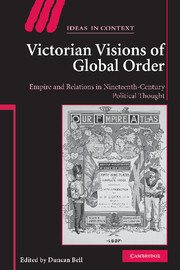 Victorian Visions of Global Order
Victorian Visions of Global Order Book contents
- Frontmatter
- Contents
- Contributors
- Chapter 1 Victorian visions of global order: an introduction
- Chapter 2 Free trade and global order: the rise and fall of a Victorian vision
- Chapter 3 The foundations of Victorian international law
- Chapter 4 Boundaries of Victorian international law
- Chapter 5 ‘A legislating empire’: Victorian political theorists, codes of law, and empire
- Chapter 6 The crisis of liberal imperialism
- Chapter 7 ‘Great’ versus ‘small’ nations: size and national greatness in Victorian political thought
- Chapter 8 The Victorian idea of a global state
- Chapter 9 Radicalism and the extra-European world: the case of Karl Marx
- Chapter 10 Radicalism, Gladstone, and the liberal critique of Disraelian ‘imperialism’
- Chapter 11 The ‘left’ and the critique of empire c. 1865–1900: three roots of humanitarian foreign policy
- Chapter 12 Consequentialist cosmopolitanism
- Index
- Ideas in Context
Chapter 11 - The ‘left’ and the critique of empire c. 1865–1900: three roots of humanitarian foreign policy
Published online by Cambridge University Press: 22 September 2009
- Frontmatter
- Contents
- Contributors
- Chapter 1 Victorian visions of global order: an introduction
- Chapter 2 Free trade and global order: the rise and fall of a Victorian vision
- Chapter 3 The foundations of Victorian international law
- Chapter 4 Boundaries of Victorian international law
- Chapter 5 ‘A legislating empire’: Victorian political theorists, codes of law, and empire
- Chapter 6 The crisis of liberal imperialism
- Chapter 7 ‘Great’ versus ‘small’ nations: size and national greatness in Victorian political thought
- Chapter 8 The Victorian idea of a global state
- Chapter 9 Radicalism and the extra-European world: the case of Karl Marx
- Chapter 10 Radicalism, Gladstone, and the liberal critique of Disraelian ‘imperialism’
- Chapter 11 The ‘left’ and the critique of empire c. 1865–1900: three roots of humanitarian foreign policy
- Chapter 12 Consequentialist cosmopolitanism
- Index
- Ideas in Context
Summary
INTRODUCTION
Though their numbers were few at mid-century, Britain by the death of Victoria possessed a substantial number of critics, chiefly on the socialist left, who challenged the reigning orthodoxy of high Victorian imperialist thought of Dilke, Seeley, Froude and others. Their contention was broadly that imperialist expansionism was not justifiable morally, and threatened, moreover, grave economic and political consequences. Such views would be a commonplace by the mid-twentieth century, and with the virtues of hindsight have vindicated that prophetic quality which a few contemporaries afforded them.
Yet while much has been written about John Hobson's classic study, Imperialism (1902), many earlier critical sources have been curiously neglected. Leading studies of the early opponents of imperialism, such as A. P. Thornton's classic if quaintly untheoretical The Imperial Idea and Its Enemies, have however done little to assess the formative development of the earlier vehement critics of empire, and of their sympathy for extra-European nationalist movements. Even the most important account of this strand of thought, Bernard Porter's illuminating study, Critics of Empire (1968), underestimates the impact of the coalescence of views examined here, and says relatively little about the formation of a left-wing critique before 1895, especially its Positivist component. And while Porter has suggested that growing ‘cultural relativism’, often combined with a disillusionment respecting the supposed merits of western civilisation, was one of the elements of anti-imperialist thought at the end of the century, he does not develop this now much more hotly-contested theme.
- Type
- Chapter
- Information
- Victorian Visions of Global OrderEmpire and International Relations in Nineteenth-Century Political Thought, pp. 239 - 266Publisher: Cambridge University PressPrint publication year: 2007
- 4
- Cited by


